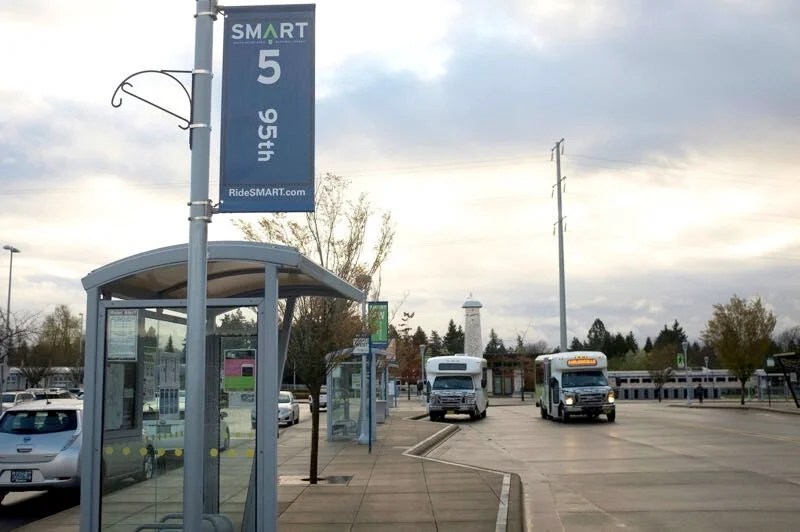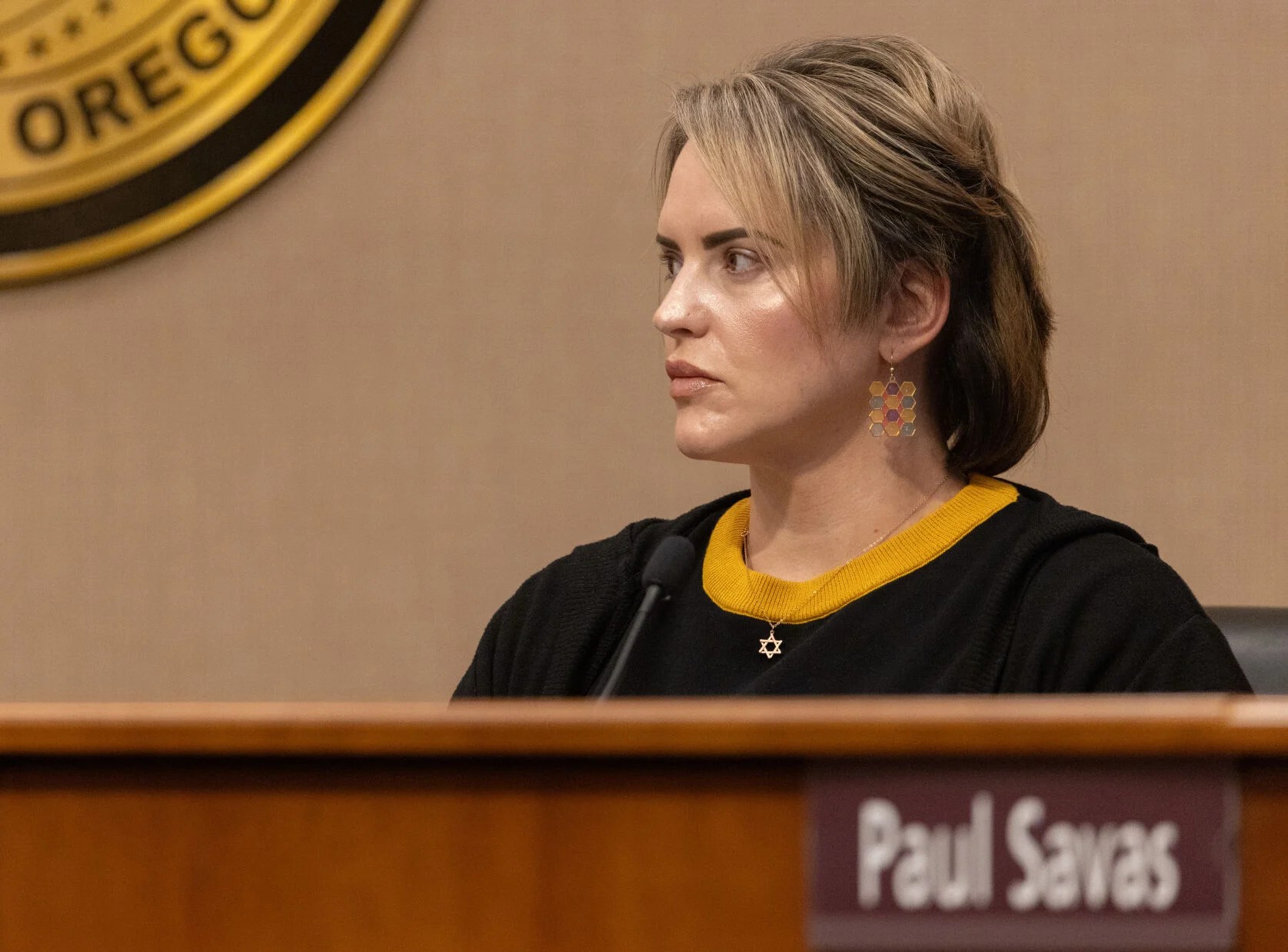Wilsonville City Council approves budget after tense transit debate
Published 5:40 pm Wednesday, June 4, 2025

- An image of a bus stop at the Wilsonville Transit Center. (Staff File Photo)
Wilsonville elected officials held another heated discussion over now-approved transit funding during a City Council meeting this week, with debate reignited by the vote adopting the city’s budget.
The council approved Wilsonville’s 2025-26 budget of $228.9 million during the meeting on Monday, June 2, in a 3-2 vote. Councilors Adam Cunningham and Katie Dunwell gave the dissenting votes, citing concerns over a new South Metro Area Regional Transit bus route to Clackamas Town Center and new full-time customer service employees included in the transit budget.
The vote followed a failed budget amendment proposed by Cunningham and supported by Dunwell, which would have reduced the transit budget by removing the four full-time employees (three additional employees are currently allocated for the new bus route) and two additional customer service representatives, which would reduce the overall budget by approximately $500,000.
The conversations among councilors and residents giving public testimony centered on concerns first raised by Cunningham and Dunwell in previous budget committee meetings that people at Clackamas Town Center could use the free bus route to come to Wilsonville and commit crimes. During the committee meetings, Cunningham also cited fiscal questions about adding employees and a new service route — both funded through Statewide Transportation Improvement Funds, with the bus route primarily funded by TriMet — while the transit fund reserves are projected to decline.
Numerous community members testified on the topic in front of the council, with a mix of those offering support for the new bus route and those in opposition who shared Dunwell and Cunningham’s concerns regarding crime and finances. Supporters noted that some residents rely on transit and said concerns for the route are based on fear.
Questions about community need, desire for new route
Cunningham argued that data did not suggest the route would have significant ridership. He said past surveys conducted for the Wilsonville Transportation Master Plan did not list the Clackamas Town Center as a destination option and argued that the new bus route did not reflect what community members desired. He also highlighted census data showing a low number of Wilsonville residents using transit for their work commute.
“We have left our citizens’ voices behind on this. It was not transparent. It was not open. We did not respect the will of our citizens in this decision making process. Therefore, I will not be complicit in creating this transit line,” Cunningham said. Some public commenters agreed with Cunningham in their testimony, saying they believed the city was not listening to their concerns.
SMART Director Dwight Brashear said the route planning was based on numerous factors, including working with Clackamas and Washington counties among others. He said the West Linn City Council voiced support for having SMART as its transit service provider when he spoke to them at the request of a former mayor, and Cunningham responded that this tied back to his argument that voices of Wilsonville residents were not included in the route planning.
Dunwell, who was on the council when the transportation master plan was adopted, reflected on the meetings discussing that plan. She noted she was absent when the vote was held and likely would have voted to approve the master plan, but said that consultants on the projects emphasized residents’ desires for weekend and night service. Dunwell added that the consultant promoted a different potential route going towards Tigard and asked Brashear why the route to Clackamas Town Center was chosen over other proposed routes.
Brashear responded that the STIF funding being used to fund the new Clackamas Town Center route, distributed to Wilsonville through TriMet, will not be given if the route duplicates a service by TriMet, so SMART would have shouldered the cost. Adding weekend service would cost roughly $2-2.5 million dollars annually, with six-to-eight new full-time employees that SMART would need to bear the cost of.
“Clackamas Town Center service … checked more of those boxes, and it got us to a point where about 90% of the cost of that service is being paid for by TriMet,” Brashear said, adding that the survey for the transit master plan also received feedback on residents wanting service outside of Wilsonville.
A debate about crime
While both Cunningham and Dunwell expressed concerns about the new route attracting crime from Clackamas Town Center, other councilors disagreed.
Dunwell said she appreciated Brashear’s feedback, but still had “significant concerns” about the route.
“Looking back, I wish that there had been a bit more due diligence on the safety side of it that had been looked into. It’s not any type of racial profiling, or demographic profiling or income profiling — it just does stand by my own personal experience,” Dunwell said.
Dunwell, who was absent from the second budget meeting and the following City Council meeting in May, said she was “disappointed” in those meetings and noted that she voiced safety concerns related to the Clackamas Town Center route based on her personal experience and before Cunningham did so. She praised the South Metro Area Regional Transit agency and Brashear in her comments explaining her opposition to the new bus route.
“I do love SMART, but I cannot support the Clackamas Town Center route. And I would hope that all of the citizens that come from a different perspective will respect my vote on this, and my perspective on this, and that we can all continue to work together,” Dunwell said.
Council President Caroline Berry said she had a different perspective than Dunwell and supported the new route.
“I believe that adding the extension … offers a lot more opportunity than it does risk. When I make decisions I look at facts, and I try not to base things on fear. I look at goals that I’m trying to accomplish,” Berry said, adding that she wants to provide as much service as possible at a cost-effective rate for citizens.
Councilor Anne Shevlin said she spoke to Wilsonville Police Chief Rob Wurpes on the matter, who told her that Wilsonville had not seen an increase in crime associated with transit routes coming from other communities such as Salem and Woodburn. Brashear reiterated this point later in the meeting after saying he had spoken with Wurpes, and Mayor Shawn O’Neil added Wurpes gave a similar response to him.
Shevlin said Wurpes told her he believes in “problem-oriented policing,” and if an uptick in crime could be attributed as coming from another community he would pull together a team to determine what action to take.
“I don’t have any concerns about whether people are coming from Timbuktu to Wilsonville. If they’re coming here to be good citizens and to enjoy our community, then they’re welcome. If they come here to break the law, then they need to be held accountable. And I feel confident that that would happen,” Shevlin said.
Brashear said in a previous interview that he was unaware of crime rates in Clackamas Town Center while determining the route, but those statistics did not factor into the decision. He said at the May 7 budget meeting that he viewed the decision through a lens of working to connect people with resources.
Responding to a question from O’Neil, Brashear said that Wurpes was surprised by concerns about crime on Wilsonville transit, as it does not currently exist. When Cunningham clarified he was referring to the importation of crime to Wilsonville from outside the city, Brashear said this has not been the transit agency’s experience when adding service to other communities such as Woodburn.
Cunningham questioned Brashear for not considering potential crime resulting from the bus route, and when asked again if crime and public safety were a consideration in the route, Brashear said that anti-discrimination laws prevent him from using the crime statistics of a particular area to determine routes.
“I can’t say I’m going to Bridgeport because there’s no crime there, and I will not go to Clackamas Town Center because there is crime. That would violate Title VI of the Civil Rights Act,” Brashear said. He later added that while individuals can decide for themselves which routes they do or do not want to take due to crime, he said he cannot do so as the transit director “because that is, at its core, discriminatory. And I’m not going to … participate in that.”
Cunningham also asked for verification that Brashear said during a recent talk he was “happy to invite” people onto buses even knowing “that they had just stolen televisions and looted them” — a comment that Cunningham said was relayed to him.
Brashear responded that he was aware “some individuals” he spoke to would pass the information to Cunningham, giving context that the conversation related to his experience working in public transit during Hurricane Katrina. Brashear said he was asked by the Louisiana governor to assist in evacuations.
“And I suggested that when it was time, and the levies had breached, that I didn’t care what anybody had done,” Brashear said. “If they needed to get out of New Orleans safely, then they could get on the bus … I had people getting on with trash bags full of their worldly goods. I didn’t care. My goal was to move them out of harm’s way.”
“There’s probably not one person in this room that hasn’t committed a crime, including yourself, sir … I’m not going to stand in judgment of you, I hope you wouldn’t stand in judgment of them.” Brashear said.
“I heartily disagree with someone jumping on one of our buses with stolen property, especially property stolen from Wilsonville and taken away, or property stolen from Clackamas Town Center and vice versa,” Cunningham responded.
O’Neil said that based on data and his own personal experience, most crime occurs from private vehicles coming to the city from I-5, “but somehow transit gets blamed.” He said this plays into a “long standing and deeply flawed narrative” associating transit expansion with crime, particularly when the transit provides service to working class or racially diverse communities.
He referenced an article on a spike in crime during the COVID-19 pandemic that has since declined, sent to him by Wurpes, and said he took away from the article that work towards public safety and infrastructure investments by municipalities like Wilsonville, schools and law enforcement has “paid off” and must continue.
“The opposition framed as a safety concern is not only unsupported by data, it risks perpetuating outdated biased fears, and delaying vital services. Our regional partners, including Clackamas County and the cities within it, are relying on our leadership to get this done,” O’Neil said. He also noted that the plans for the route have been present in previous budgets and the master plan process with no concerns raised.
“The public may have chosen not to pay attention, but there is a difference between the public not paying attention and being deprived access to (communication),” O’Neil said.
Financial concerns
After Cunningham questioned if the transit fund’s reserves have faced a significant projected downturn before, City Manager Bryan Cosgrove said that the reserves fluctuate over time due to planned allocations toward capital projects.
“The reserves are built up over time for different purposes. We’ve had some pretty significant capital drawdowns of the reserves … so the reserve’s going to fluctuate,” Cosgrove said, adding that the reserve levels can never go below an operating minimum set for each of the city’s funds.
When Cunningham asked if business taxes, which help fund Wilsonville’s public transit, would be increased if the reserves got low enough, Cosgrove said if the city were to lose the STIF funding the council would be having “a different conversation” and staff would come back to council to discuss cutting services or increasing the payroll tax.
“Nobody’s suggesting that we’re raising the business tax for this route or any other route that’s funded by STIF. Those are all funds that are allocated to expanding services that make connections within the region that don’t exist,” Cosgrove said. He later added: “If that funding goes away, we don’t have the money to fund that route.”
Cosgrove added that forecasts are for planning purposes, “not a self-fulfilling prophecy,” with Wilsonville Finance Director Keith Katko adding that the forecast can be revised over time.
The transit budget has been operating in the black since before 2020 after receiving state and federal funds along with hiring Brashear to lead the department, Katko said.
“I didn’t spend the last eight years building what is arguably the healthiest budget in the city, to tear it down. That’s certainly not my goal,” Brashear said, adding that as the transit director he had an obligation to put out services, which cost money, and he was proud of being part of the team that built the budget in its current state.
Cunningham later said that he was not trying to “ruin” the transit agency and his concerns were about specific issues. He also noted the public testimony sharing his views and opposing the new bus route both during the meeting and in statements emailed to the council.
“It needs to be very clear that I’m not trying to play a political game here. I have support for SMART. But when I see an issue that could affect our citizens negatively, when I see an issue where our citizens were not a part of the conversation in the proper way, it wasn’t fair, open and transparent, I will raise those issues,” Cunningham said.





